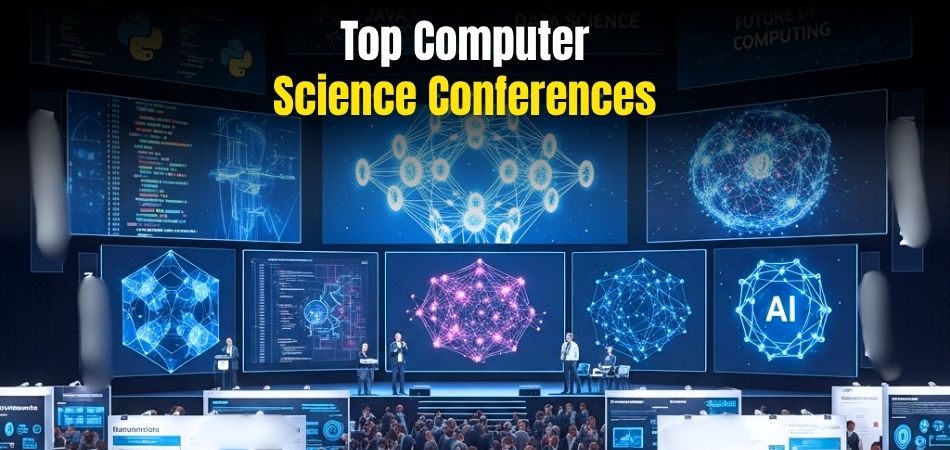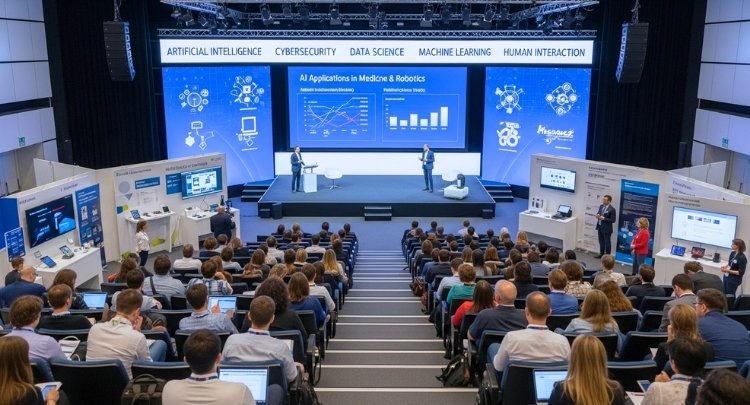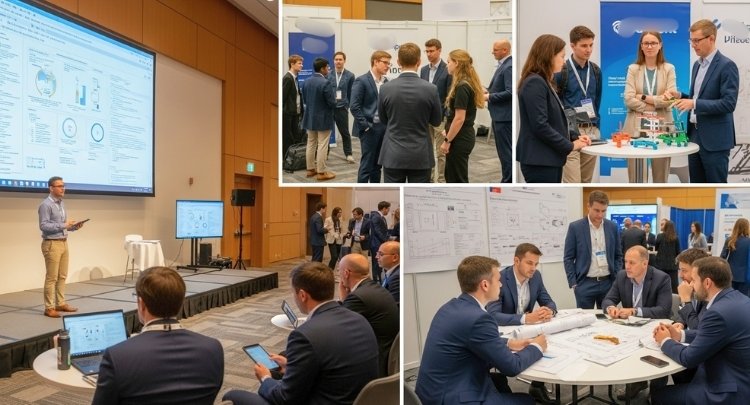Computer science continues to shape how technology grows, touching everything from daily apps to powerful research tools. With so much progress happening, people often want to know which events lead the way. That curiosity naturally brings attention to top computer science conferences.
Attending tech events boosts learning, ideas, and innovation fast. The 39th Global Conference on Information Technology and Computer Science, IEEE Symposium on Foundations of Computer Science, and Innovations in Theoretical Computer Science. They focus on algorithms, theory, and modern computing. These events shape future breakthroughs in global computer science.
Readers interested in this field may already be thinking about these conferences. They might want to explore what happens at such events and why they matter. This article provides every important detail, helping readers understand what makes these conferences stand out.
Top Computer Science Conferences
Technology conferences are great places where experts and learners come together to share ideas, present research, and talk about the future. In computer science, such events often highlight important topics like algorithms, machine learning, and computing systems. These conferences also bring new innovations and fresh discussions to a global stage. Let’s look at some of the top computer science conferences coming up soon.
- 39th Global Conference on Information Technology and Computer Science | November 8, 2025 – Toronto, Canada
- IEEE Symposium on Foundations of Computer Science (FOCS) | December 14–17, 2025 – Sydney, Australia
- Innovations in Theoretical Computer Science (ITCS) | January 27–30, 2026 – Milan, Italy
- International Conference on Computer Science, Machine Learning and Artificial Intelligence | January 16–17, 2026 – Melbourne, Australia
- Australasian Computer Science Week (ACSW 2026) | February 9–13, 2026 – Melbourne, Victoria, Australia
- CM Symposium on Computer Science and Law | March 3–5, 2026 – Berkeley, California
- Conference on Computer Science and Intelligence Systems (TheIIER) | April 6–7, 2026 – Melbourne, Australia
- International Conference on Computing and Machine Intelligence (ICMI) | April 9–10, 2026 – Al-Ahsa, Saudi Arabia (Hybrid)
- Conference on Computing and Artificial Intelligence | April 24–27, 2026 – Okinawa, Japan
- International Conference on Computer and Information Science and Technology | August 16–18, 2026 – London, United Kingdom
1. Global Conference on Information Technology and Computer Science (GCITCS)
This event brings forward a broad mix of topics that shape today’s digital world. Counted among the upcoming international conferences, it will take place on November 8, 2025, in Toronto, Canada. Participants can attend talks that highlight modern research in information technology and computer science. It also allows people to share their work and connect with professionals from around the globe.
2. IEEE Symposium on Foundations of Computer Science
The focus here is on the theoretical side of computer science, including algorithms and complexity theory. Scheduled for December 14–17, 2025, in Sydney, Australia, this conference is one of the leading platforms for discussing fundamental CS research. Experts from across the world join to present work that shapes the very basics of computing systems and problem-solving.
3. Innovations in Theoretical Computer Science
This conference is known for exploring the depth of algorithms, logic, and theory of computation. It will be hosted at Bocconi University in Milan, Italy, from January 27–30, 2026. The sessions usually include talks on both classic problems and fresh ideas in theoretical computer science. Researchers and students attend to share insights and learn from leading thinkers.
4. International Conference on Computer Science, Machine Learning and Artificial Intelligence
Researchers gather here to discuss ideas in machine learning, artificial intelligence, and computer science. This event is scheduled for January 16–17, 2026, in Melbourne, Australia. It covers trending areas in technology and provides a stage for experts to present new findings. Participants get the chance to find the latest developments across multiple areas of computing.
5. Australasian Computer Science Week 2026
A special feature of this event is that it combines multiple conferences and workshops. It will be held from February 9–13, 2026, in Melbourne, Victoria, Australia. The week-long program spans many fields in computer science, giving attendees a wide variety of sessions to attend. This makes it one of the most diverse and engaging gatherings for computer science enthusiasts.
6. CM Symposium on Computer Science and Law
This unique event focuses on the link between computing and legal systems. It is scheduled for March 3–5, 2026, in Berkeley, California. Discussions often highlight how computer science interacts with law, including issues like digital rights and regulations. The combination of two important fields makes this conference stand out as highly relevant to today’s world.
7. Conference on Computer Science and Intelligence Systems
Researchers from different fields will come together on April 6–7, 2026, in Melbourne, Australia, for this event. The sessions are expected to cover a broad mix of computer science topics alongside advances in intelligence systems. Attendees can expect meaningful discussions and presentations that connect practical applications with ongoing research in computing.
8. International Conference on Computing and Machine Intelligence
The main focus here is on machine learning, computing, and intelligent systems. It is set for April 9–10, 2026, at King Faisal University in Al-Ahsa, Saudi Arabia, with both in-person and hybrid participation options. The event brings together researchers and practitioners to share insights on applications and methods that drive the growth of smart systems worldwide.
9. Conference on Computing and Artificial Intelligence
Artificial intelligence and computing developments take center stage at this event. It is planned for April 24–27, 2026, in Okinawa, Japan. Experts will discuss new research and applications that are shaping industries. The sessions are designed to give a balanced view of both theoretical studies and practical uses in computing and artificial intelligence.
10. International Conference on Computer and Information Science and Technology
Professionals and academics interested in computer science and information technology will find this conference a great opportunity to connect and share ideas. It will be held on August 16–18, 2026, in London, United Kingdom. The event provides opportunities for attendees to present research, learn about new ideas, and take part in interactive discussions about the future of computing.
These conferences open doors to new ideas, valuable connections, and deeper knowledge in computer science. They not only highlight important topics but also bring together communities that drive progress in technology. Attending or following these events can inspire fresh thinking and innovation.
How Do Top Computer Science Conferences Shape Future Research Directions?
Groundbreaking conferences often create spaces where experts introduce ideas that can change the way technology grows. These events are not just about presenting research, but also about shaping the topics that become important in the future. Many discoveries introduced here later influence industries, education, and daily life. To understand this better, let’s look at how top computer science conferences play such an important role.
New Ideas
Fresh theories and bold solutions often appear for the first time at these conferences. When a researcher presents their paper, it gives others new angles to think about. Over time, such ideas can evolve into core parts of technology that many others continue to study, refine, and expand further.
Research Trends
A strong paper can spark interest in a specific subject, and soon, more people begin working on it. This is how a simple idea turns into a trend. Within a few years, the topic may grow into a major branch of computer science.
Collaboration Impact
When scientists from different parts of the world meet, they often start new partnerships. These collaborations combine strengths and skills that lead to stronger projects. Such joint efforts have the power to move certain research directions much faster than working alone.
Academic Influence
Universities pay close attention to the topics highlighted in conferences. Many times, these discussions inspire the subjects chosen for new courses or research projects. This means that future generations of learners get introduced to concepts that first gained attention at these events.
Industry Connection
Technology companies also look closely at what is being presented. If a paper shows real promise, industries might adopt the idea and apply it to real-world products. This link between research and business helps ensure that discoveries make a wider impact.
Conferences give direction to both research and application, making them powerful forces in shaping technology. They set the stage for ideas that can influence work for many years, guiding the way forward in computer science.
What Are the Key Topics Covered at Top Computer Science Conferences?
Conferences are important because they bring together people with great ideas. These events often become places where important subjects in computer science are discussed. Researchers and experts share their latest findings and future possibilities. To see how diverse these discussions are, let’s explore the key topics often covered.
Artificial Intelligence
Experts usually highlight how machines can perform tasks requiring human-like reasoning. At conferences, discussions often explain both achievements and ongoing difficulties in this field. Many examples show AI being applied in medicine, business, and robotics. These talks help audiences see how artificial intelligence is slowly becoming a bigger part of daily technology.
Cybersecurity
With threats increasing online, this field gets strong attention in conferences worldwide. Speakers usually focus on improving safety, protecting data, and stopping cyberattacks. Presentations often cover both technical methods and policy issues that shape the future. This mix attracts businesses, governments, and researchers who want stronger systems and safer environments for users.
Data Science
Large amounts of information are being studied in this field every day. At conferences, experts present advanced techniques to collect, analyze, and understand data better. Sessions show how data supports smart decision-making in industries like healthcare, marketing, and education. These presentations also underline the importance of accuracy, security, and innovation when handling sensitive data.
Machine Learning
Researchers present new models that allow computers to learn from patterns and data. In many conferences, case studies show real applications such as voice recognition and self-driving vehicles. Speakers also highlight problems of reliability and fairness in systems. These sessions encourage new methods that make machine learning more practical and trustworthy across industries.
Human Interaction
Talks in this area deal with how people connect with digital devices. Experts often explore new designs that improve usability and accessibility for different users. Examples include better screen layouts, wearable technology, and assistive tools. These discussions ensure that computer systems remain user-friendly while adapting to growing human needs and expectations worldwide.
Conferences cover many important subjects that continue to shape modern computer science. They allow experts to share solutions that influence research and industry together. Each topic brings a unique value that benefits society and everyday technology. Attending or following these events helps people understand trends clearly.
How Do Top Computer Science Conferences Support Industry and Academia Collaboration?
Top computer science conferences act as meeting points for experts from both universities and industries. These events allow people to share research, new ideas, and practical knowledge. They encourage open discussion that benefits everyone involved in the field. To see how they build connections, let’s look at some key points.
Knowledge Exchange
Researchers often present their findings in front of professionals from the industry. This exchange helps companies understand the latest theories and developments in technology. At the same time, researchers learn about real challenges businesses face every day. Such sharing creates a two-way flow of knowledge that strengthens both sides greatly.
Networking Space
These events provide a place where meaningful professional relationships can be formed. Industry leaders meet talented researchers, and students connect with possible future employers. By attending workshops, panels, and social gatherings, people often discover opportunities for collaboration. This type of networking helps bridge the gap between academic ideas and industry needs.
Joint Projects
Many successful collaborations between companies and universities begin at conferences. When experts meet, they often decide to work together on projects. This cooperation brings academic research closer to real-world applications in technology. Such partnerships allow fresh theories to be tested and improved through practical use.
Talent Discovery
Companies attend these conferences not only to learn but also to find talent. Researchers and students presenting their work often attract attention from hiring managers. Businesses can recruit people who already have strong research experience. This process benefits industries by bringing in fresh minds with innovative thinking.
Technology Transfer
Another important part of these conferences is moving research into practical solutions. When a new idea is presented, companies can take it forward into development. This process ensures that theories are turned into tools, products, or systems. It allows society to benefit directly from what researchers have discovered.
These conferences are important for connecting academic research with industry progress. They ensure that new theories are tested and used in real situations. They also give companies access to talented minds and fresh solutions. Together, these benefits push technology forward in meaningful and lasting ways.
What Networking Opportunities Do Top Computer Science Conferences Provide?
Networking is one of the most valuable parts of top computer science conferences. These events bring together people from many backgrounds with shared interests. Attendees often find opportunities to meet experts, connect with recruiters, and join active research groups. To better understand these chances, let’s look at how networking usually works at such conferences.
- Expert Sessions: Attendees can interact with leading experts during talks and panels, which often lead to personal discussions where deeper insights are shared and valuable professional relationships are built.
- Recruiter Meetings: Many companies send representatives who are actively seeking skilled professionals, giving attendees a chance to showcase their talents and explore possible career opportunities.
- Research Groups: Academic teams often present their ongoing projects and invite participants to join or collaborate, allowing fresh voices to contribute ideas and strengthen research outcomes.
- Workshops Events: Smaller, focused workshops allow participants to connect with like-minded individuals, while solving problems together often creates a strong bond and future professional collaborations.
- Social Gatherings: Informal meetups, dinners, and coffee breaks provide relaxed settings where participants can build lasting connections beyond technical sessions and exchange ideas freely.
- Career Fairs: Dedicated spaces are often set up for career-focused discussions, where recruiters and job seekers have structured opportunities to connect and explore potential matches.
- Poster Sessions: Presenters stand beside their posters while discussing ideas with attendees, creating personal one-on-one interactions that can spark future research or professional opportunities.
Networking at these conferences goes beyond exchanging business cards or casual talks. It creates professional links that can last for many years. These opportunities help people grow in their fields while also opening new doors. Building these connections often leads to strong collaborations and career success.
How Do You Choose the Right Computer Science Conference to Attend?
Choosing the right computer science conference is not always simple, especially with so many options available every year. These events differ in topics, locations, and the kind of audience they attract. Attending the right one can make a big difference for learning and growth. To make the choice easier, here are some useful points to consider.
Research Focus
Looking at the main topics of the conference is very important. A person should check if the sessions match their research field. Conferences focused on similar subjects provide the most benefit, as they allow learning and sharing with people who have the same interests and expertise.
Location Choice
The place where a conference is held also matters a lot. Some people prefer nearby events to save time and travel costs. Others may choose international ones for global networking. Location often affects how many people can attend and what kind of audience is present.
Budget Planning
Thinking about the total cost before attending a conference is always smart. Travel, registration fees, food, and stay all add up quickly. Some conferences offer student discounts, online options, or scholarships. Planning the budget helps ensure the experience is both affordable and worthwhile.
Audience Type
Knowing who usually attends the conference makes decision-making easier. Some events attract mostly academics, while others bring in industry professionals. The audience type helps in choosing conferences that match personal goals, whether for research discussions, job opportunities, or exposure to industrial practices.
Event Reputation
Well-known conferences usually offer more recognition and stronger connections. Checking past events, speaker lists, and topics can help judge quality. Prestigious conferences often have stricter paper selection, which means the research shared there is highly valuable and respected by the community.
Picking the right conference is all about balance between goals, location, and cost. A thoughtful choice ensures both learning and professional growth. Each event offers something unique to researchers and participants. Attending the right one can truly boost knowledge and connections.
How Much Does It Cost to Attend Top Computer Science Conferences?
The cost of attending top computer science conferences can vary a lot depending on several factors. People often need to plan carefully so that they can manage both participation and expenses smoothly. These costs include direct payments like registration, as well as extra expenses. Let’s break down the main things that make up the overall cost.
Registration Fees
Registration fees usually make up the largest portion of the budget. Regular fees often average around 600 USD, but some conferences offer early bird options that bring the price down to about 500 USD for those who sign up early.
Visa Costs
If the conference is held in another country, you will likely need a visa. The price depends on the country and the type of visa required. This cost is separate from registration and can sometimes be quite high, depending on travel rules.
Travel Expenses
Flight tickets or other travel costs can take up a large part of the budget. For international conferences, airfare may even be higher than the registration fee. Planning in advance usually helps reduce this cost, especially with early bookings.
Accommodation
Staying near the conference venue is often important but can be costly. Hotels in city centers or close to universities usually charge more during event dates. Some attendees save money by sharing rooms or booking budget-friendly places.
Food and Daily Needs
Meals during the trip are another expense to think about. Some conferences include snacks or lunches, but dinners are often separate. Daily expenses such as transport within the city or other personal needs can also add up.
Overall, attending a computer science conference often costs much more than just the registration fee. When you add visa, travel, hotel, and food expenses, the total can become a large amount. Careful planning helps make sure the experience stays affordable and worthwhile.
How Do Virtual and Hybrid Options Change the Way People Attend Top Computer Science Conferences?
Computer science conferences today are not limited to physical halls and big venues. Many now offer virtual and hybrid options alongside traditional attendance. Each format comes with unique advantages and challenges. To understand the differences better, let’s compare them directly.
| Aspect | Virtual Conferences | Hybrid Conferences |
| Accessibility | Easy access worldwide with only the internet needed, no travel required. | Offers both online and physical access, making it flexible for participants. |
| Costs | Lower costs since no travel or hotel is needed, only registration fees apply. | Costs vary depending on attendance mode; online is cheaper while physical is higher. |
| Networking | Online chats, breakout rooms, and virtual meetups allow limited personal interaction. | A mix of online networking tools and face-to-face interactions is available. |
| Learning Experience | Recorded sessions and replays available for flexible learning anytime. | Combines live sessions on-site with recordings for online participants. |
| Challenges | Technical issues, less personal interaction, and time zone problems may occur. | Balance is tricky; online participants may feel less engaged than on-site ones. |
Choosing between virtual, hybrid, or in-person conferences depends on personal needs and resources. Each format serves a different purpose and audience effectively. While in-person brings stronger engagement, virtual and hybrid ensure wider accessibility. Balancing these options helps participants make the most out of conferences.
FAQs About Top Computer Science Conferences
Most top computer science conferences last between two and four days. The program usually includes keynote speeches, paper presentations, workshops, and poster sessions. Some may extend with tutorials or pre-conference events. This format ensures enough time for both learning and networking.
How Are Speakers Selected at Top Computer Science Conferences?
Speakers are usually chosen through a strict review process by the conference committee. Researchers submit papers or proposals months before the event. A panel of experts reviews them for quality, originality, and relevance. Only the best submissions are accepted for presentations or keynotes.
What Is the Role of Keynote Speakers in Top Computer Science Conferences?
Keynote speakers are leading experts invited to present major talks. Their role is to highlight the most important current topics in the field. They often provide insights into future directions of research and industry. These talks set the tone for the rest of the conference.
Do Top Computer Science Conferences Provide Certificates?
Yes, many conferences provide certificates to participants, presenters, and attendees. These certificates can be useful for professional records and academic recognition. They confirm active participation in the event. Some even carry extra value when linked to reputable organizations like IEEE or ACM.
How Early Should Participants Register for Top Computer Science Conferences?
It is always better to register months in advance. Early registration often gives discounted fees and ensures a confirmed spot. Popular conferences may sell out quickly due to high demand. Planning early also helps in booking affordable travel and accommodation.
What Types of Sessions Are Common in Top Computer Science Conferences?
Conferences usually include keynote speeches, paper presentations, workshops, panel discussions, and poster sessions. Some also add tutorials, networking events, or career fairs. This mix provides opportunities for learning, discussion, and professional growth. The variety makes these conferences rich and valuable experiences.
How Do Students Participate in Top Computer Science Conferences?
Students can attend as listeners, presenters, or even volunteers. Presenting papers or posters gives them recognition and feedback from experts. Volunteering helps them connect with professionals while assisting in event organization. Many conferences also offer student discounts or travel grants.
What Is the Difference Between Regional and International Computer Science Conferences?
Regional conferences usually focus on issues or research relevant to a specific area. International conferences bring together participants from all over the world. The global events are larger and cover more diverse topics. Both types, however, provide valuable platforms for sharing knowledge and networking.
Do Top Computer Science Conferences Include Competitions?
Some conferences organize competitions like coding challenges, hackathons, or best paper awards. These competitions encourage innovation and active participation. Winners often receive recognition, prizes, or publishing opportunities. Competitions also make the events more engaging for younger participants.
How Has Technology Changed Top Computer Science Conferences?
Technology has made conferences more accessible and interactive. Virtual platforms now allow live streaming, recorded sessions, and online networking. Mobile apps help attendees track schedules and interact with speakers. These changes ensure that more people can benefit from the events worldwide.
Conclusion
Conferences in computer science continue to bring together experts, learners, and innovators from across the world. They serve as platforms where ideas grow, research gets shared, and communities form around common interests. Such events have a lasting effect on technology and society.
The top computer science conferences cover fields such as algorithms, machine learning, artificial intelligence, computing systems, and cybersecurity. These events create opportunities to learn from experts, share research with peers, and connect with global professionals. Attending them gives real knowledge and practical insights that shape the future.
To get the most from these conferences, plan early, select events that match your goals, and balance budget with value. Use networking sessions wisely, keep track of key talks, and stay open to learning. Wishing you success in your future conferences.









